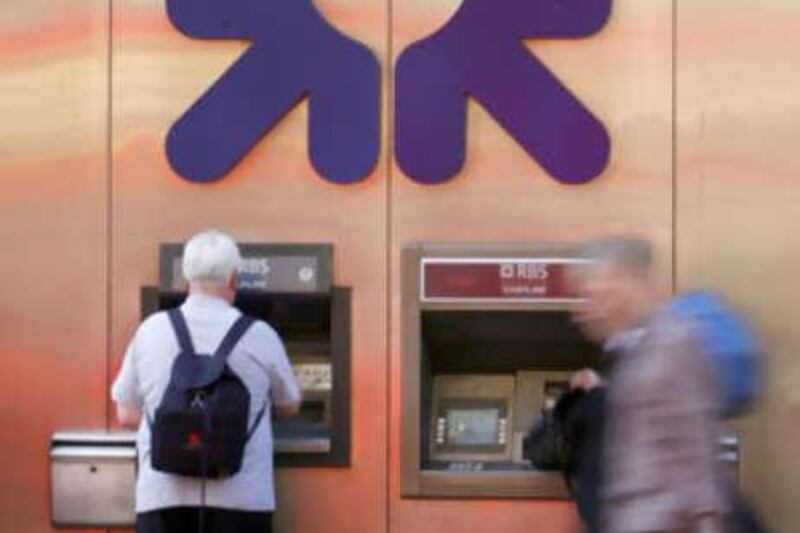LONDON // The Royal Bank of Scotland (RBS) will this week unveil the biggest loss in the history of British banking because of a multibillion-pound hit from the global credit crunch. RBS, which is due to announce interim earnings on Friday, is predicted to reveal a pre-tax loss of at least £1 billion (Dh7.2bn) for the first six months of the year.
Analysts also warned that Britain's second-largest bank could face a loss of as much as £1.7bn, The Sunday Times and other major British newspapers reported yesterday, without citing sources. Strains from the global squeeze on credit would cost RBS almost £6bn, the newspaper added. Meanwhile, Britain's biggest bank, HSBC, was due to post first half numbers today, followed later by Barclays and Standard Chartered.
Earlier this year, RBS clinched a record breaking rights issue totalling £12bn to shore up its finances after huge subprime-related write-offs and the mammoth takeover of the Dutch giant, ABN Amro. RBS is in "advanced talks" with Allstate, an American insurer, about selling its insurance operation, the newspaper reports said, without citing sources. RBS, Barclays and Allstate could not be reached immediately for comment. HSBC declined to comment.
Investors are on edge about the cost of write-offs caused by the US subprime or high-risk housing crisis and the subsequent tightening of global lending conditions. Last week, the British banks, Alliance & Leicester, Halifax Bank of Scotland (HBOS) and Lloyds TSB said that their interim profits plunged dramatically as they felt the chill from the credit crunch. Alliance & Leicester posted a first half loss because of credit write-offs and higher funding costs.
The net loss was £23.9 million, or 5.7 pence a share, compared with a profit of £183.6m a year earlier, said the bank, based in Leicester. It wrote off £398m on its Treasury investments and met the first half loss estimates of analysts. Banco Santander, Spain's biggest bank, agreed to buy Alliance & Leicester for £1.3bn last month and inject £1bn of capital. That will provide "greater stability and greater certainty", David Bennett, the bank's chief executive, said last week. British banks, including HBOS, are pulling back on lending as the credit squeeze increases the cost of funding in capital markets.
"The funding is ugly and isn't getting better, and that is why they sold themselves to Santander," said Simon Maughan, an analyst at MF Global Securities in London. Lloyds TSB reported a 70 per cent drop in first half profits last week following a £585m hit from its exposure to risky assets, and warned that bad debts on mortgages were rising as house prices fell. Lloyds TSB, the first British bank to report interim results, missed analysts' forecasts as its core capital ratio was lower than expected. Some analysts expressed concern about further mortgage impairments this year.
"The underlying growth is good, but the flagged impairment charge for the mortgage book in the second half is perhaps heavier than expected," said Mike Trippitt, an analyst at Oriel Securities. "The statement flags that they cannot continue to grow at the rate we've seen in the last few years, given the economic environment in which they are operating." Lloyds predicted that UK house prices would fall by up to 15 per cent which, it said, could add £100m to bad debts in the second half, and prices could fall by five per cent or more next year.
But the bank said its underlying businesses had performed well and it was "well positioned for a lower growth environment". Britain's biggest home lender, HBOS, said last Thursday it was considering asset sales after reporting that first half profits halved due to a £1.1bn hit on bad debts caused by the credit crunch. Analysts detected no nasty shocks in the results and said profits beat expectations, costs appeared under control and the shares had already been hit hard.
The bank said it would consider selling assets if the right price were offered, but would not comment on whether that meant its Australian operation, Bankwest, was up for sale. "We will look at all sensible options over time to improve deposit-to-loan ratios," said Andy Hornby, the bank's chief executive. "That's about running down some assets, and if some buyers consider assets are worth more to them than they are to us, then we don't rule that out."
* With Agencies





